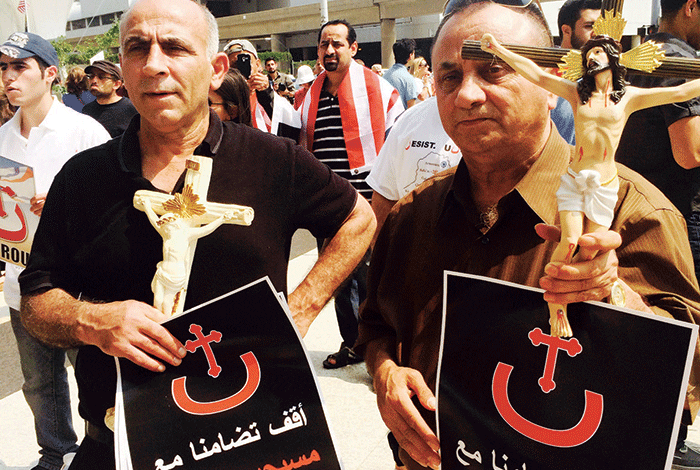
|
| Iraqi Christians protesting religious cleansing in Detroit August 2014 during a unity rally where the Chaldean and Assyrian communities of Michigan were asked to unite for the survival of Iraqi’s religious minorities. |
DETROIT — “To the Chaldean and Assyrian community of Michigan, enough with the division,” said Noor Mattr, a young Iraqi Christian activist at a rally for Iraq’s religious minorities in August. “You will never agree on everything. However, I beg you guys to unite for the sake of our people back home. Our survival back home depends on your unity here.”
Many Chaldean, Assyrian and Syriacs agree with Mattr’s message of unity and believe the future of Iraq’s Christians depends on it.
“If we do not unite now, say goodbye to our history,” said Olivia, a local Chaldean who chose not to use her real name. “No more of our history. No more Chaldeans, Assyrians and Syriacs.”
She acknowledged that there are differences between the three communities, but said they should put them aside.
This is a pivotal time in history for Iraqi Christians. More than half of Iraq’s Christians were forced to flee their homeland following the 2003 U.S. led invasion of Iraq, because of persecution.
Last year, the future of Iraq’s Christians became more uncertain than ever after ISIS gained a stronghold in Mosul, giving Christians an ultimatum to leave, pay a special tax, convert to Islam or be killed.
Today there are only an estimated 300,000 to 400,000 Iraqi Christians living in their homeland and many of them are seeking asylum because of the emergence of ISIS.
Chaldeans, Assyrians and Syriacs are all the indigenous peoples of Iraq and Christians who speak Aramaic— the language of Christ.
They all trace their roots back to the Nineveh plains of northern Iraq and a time long before the establishment of the Republic of Iraq.
“We have a history together that dates back thousands of years,” said Patrick Bakoz, a Syriac American activist. “Sometimes Chaldeans, Assyrians and Syriacs like to discuss how we are different, but really we are not different. For sure, for the enemy it is easier to control a small group than one large group. This is very important. It is time to wake up.”
Importance of conveying one message
“It is important that we go to different parliaments with the same message,” said Nahren Anweya, a Assyrian American activist.
Olivia said right now members of the Iraqi Christian community are conveying different messages to the United States government, which could be detrimental to preserving religious minorities culture in Iraq.
“Some are asking for a complete exodus of Iraqi Christians from Iraq,” she said. “We have others who are saying we want a safe haven to preserve our heritage back home and want our own military and government. Two groups are conveying different messages. The danger of this? First of all they are laughing at us at the White House.”
Olivia said she personally supports the idea of a safe haven for Iraqi Christians.
“If there is a full on exodus then in 10 to 20 years from now, you tell people where you are from and there won’t be any evidence or proof of it,” she said.
Bakoz said while Chaldeans, Assyrians and Syriacs don’t belong to the same church, they all share the same nationality.
“We should just talk as one. We should really speak as one church, and just be one,” he said.
Anweya said it saddens her that Chaldeans, Assyrians and Syriacs are being represented legally as different groups.
“Why not unite our churches and show the world that we are united and want our land back?” she asked.
She said she supports the idea of having one flag for Chaldeans and Assyrians that unites the three churches. Currently two separate flags exist.
“If you look at our history we are one. We are not two nationalities we are one, ” Olivia said.
Crisis brings three communities together
Anweya said ISIS’ actions has given Iraqi Christians worldwide a wake up call and pointed out that they were all a part of one homeland.
“We all originate from the cradles of civilization,” she said. “This is what God wants. He wants us to become one again. We are fighting for the Nineveh plains.”
Ben Kalasho, the founder of the Chaldean American Chamber of Commerce in San Diego said the recent crisis facing Iraqi Christians brought unity between the comunities.
“ISIS brought unity between our three communities,” he said. “At one of my rallies organized in San Diego my opening line was, ‘Did we really need a genocide to come together under the commonality of oneness.”
Kalasho said ISIS has unintentionally started the conversation of unity between the three communities.
“I emphatically urge every single Assyrian, Chaldean and Syriac to be a rational player,” he said. “The future, it seems to me, is at a pivotal point. The question to ask is, what do we all want? And I would hedge my bets that all of us, deep down, want a place to call home. A place to point to on a map. A place to take our children one day. A place where a thousand years from now will still remain.
“Now, if that is true, if what I’ve said convinces you, then unite. Jettison your ethnocentric ways and adopt progressive thinking. Be the Change.”






Leave a Reply